Archive for July, 2009

Women still face pay gap
 (CNS): Despite the fact that more women than men in the Cayman Islands have a college or university education they are still earning less than their male colleagues in the work place. Among the many revelations in the latest Labour Force Survey produced by the Economics and Statistics Office, is the fact that women continue to suffer inequality in pay even in the same professional groups as men. Acording to the report which was conducted in the fall of last year more than 46.6% of women in the Caymanian workforce have been to college or university compared to 36.7% of men. However, even though the work force is almost equally balanced among the sexes it is not balanced when it comes to earnings.
(CNS): Despite the fact that more women than men in the Cayman Islands have a college or university education they are still earning less than their male colleagues in the work place. Among the many revelations in the latest Labour Force Survey produced by the Economics and Statistics Office, is the fact that women continue to suffer inequality in pay even in the same professional groups as men. Acording to the report which was conducted in the fall of last year more than 46.6% of women in the Caymanian workforce have been to college or university compared to 36.7% of men. However, even though the work force is almost equally balanced among the sexes it is not balanced when it comes to earnings.
In the highest earning bracket on the island (those earning over $7,200 per month) men out number women by more than two to one and in the second highest (between $4800-7199) there are 2189 men and only 1944 women. There are almost four times as many women in the lowest earning bracket (less than $799 per month) than men and almost twice as many women in the second lowest earning bracket ($800-1599 per month).
Women throughout the western world are still battling to earn the same as their male counterparts and the disparity in pay is often considered to be down to the fact that women are more likely to be in part time work then men. In Cayman the part time workforce is dominated by women, out of 2126 workers who are considered part time employees 1247 of them are female. However, according to this latest survey women still work on average just under 41 hours per week compared to the male average of just under 43 hours.
The pay gap is even more evident between the sexes with regards the professional occupations while 62% of workers in the financial services sector are women, one of the highest earning industries, women are dominating in lower paid positions in that profession.
Of the more than 1550 men earning $7200 per month or more almost all of them worked in professions described as Legislators, Senior Officials & Managers Professionals Technicians & Associate Professionals. Only 754 women in the same professions were in the higher earning bracket and most fell into the medium range salary brackets. Of the 6631 men working in senior professional occupations almost half, (3277) were in the top two earning brackets. In comparison in the same professional categories there were 7209 women but only around 35% (2467) of women were in the top two earning brackets.
The gender pay gap is seen by professionals as one of the many reasons why women tend to be poorer than men. In the recent National Assessment of Living Conditions researchers found that in the country’s lowest quintile, the poorest people in the community, conditions for women were worsethan men.
Despite various committees established to look into gender affairs the Legislative Assembly has yet to pass legislation to give domestic application to the UN Convention of the Elimination of All Forms of Discrimination Among Women, although it has been talked about for several years.
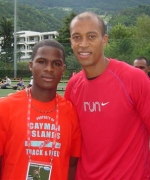
Athletes compete in Rome
 (CNS): Three Cayman Athletes who competed in the 6th IAAF World Youth Championships in Sudtirol, Italy, came away with an experience that they will never forget. Travis Webb, Andrew Perrin and the Cayman Islands’ only female athlete, Gizel Wright, had fair results in their events, according to the Cayman Islands Athletic Association (CIAA). Perrin managed a 5th place finish in heat 10 of the boys 100m in a time of 11.32s, while Wright finished in 7th place in heat 2 of the girls 100m in a time of 12.87s. Webb equaled his personal best of 2.00m in group A of the boy’s high jump but did not advance to the finals. (Left: Andrew Perrin and Stephane Diagana of France)
(CNS): Three Cayman Athletes who competed in the 6th IAAF World Youth Championships in Sudtirol, Italy, came away with an experience that they will never forget. Travis Webb, Andrew Perrin and the Cayman Islands’ only female athlete, Gizel Wright, had fair results in their events, according to the Cayman Islands Athletic Association (CIAA). Perrin managed a 5th place finish in heat 10 of the boys 100m in a time of 11.32s, while Wright finished in 7th place in heat 2 of the girls 100m in a time of 12.87s. Webb equaled his personal best of 2.00m in group A of the boy’s high jump but did not advance to the finals. (Left: Andrew Perrin and Stephane Diagana of France)
Star performers at the Championships, which ended 12 July, were double Gold Medalist Kirani James of Grenada and Jodie Williams of Great Britain. James won the boys 200m and 400m, making him the first at this level to achieve such a feat. In the process, he set a new record of 45.24s in the 400m. Williams added her name to the history books as she is the first girl to ever take the 100m and 200m sprint double, winning both events in world leading times.
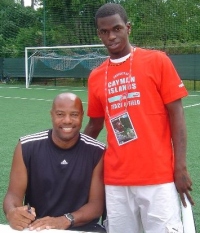 CIAA said the Cayman athletes made friends with their fellow athletes from around the world and met with Olympic legends at the IAAF sponsored master class clinic for all participants. In attendance was Mike Powell of the US, world record holder in the long jump; Kajsa Bergovist of Sweden, world in-door record holder in the women’s high jump; Kelly Holmes of Great Britain, double gold medalist in the 800m and 1500m at the 2004 Olympics games; and Wilson Kipketer of Denmark, world record holder in the 800m. (Right: Travis Webb and Lond Jump World Record Holder Mike Powell of US)
CIAA said the Cayman athletes made friends with their fellow athletes from around the world and met with Olympic legends at the IAAF sponsored master class clinic for all participants. In attendance was Mike Powell of the US, world record holder in the long jump; Kajsa Bergovist of Sweden, world in-door record holder in the women’s high jump; Kelly Holmes of Great Britain, double gold medalist in the 800m and 1500m at the 2004 Olympics games; and Wilson Kipketer of Denmark, world record holder in the 800m. (Right: Travis Webb and Lond Jump World Record Holder Mike Powell of US)
The main purpose of the clinic was to hear first hand from these legends of the sport about a wide range of topics including training, drugs, and how to make a career in track and field. These presentations were followed by an interactive session at the warm up track which included demonstrations of various events, tips and training cues, and an autograph and photo session with the stars.
The team was managed Ms. Sana Tugman and coached by Tyrone Yen. They returned to the Cayman on Tuesday 14 July. Below: 100m winner Jodie Williams (left) and Caymans Gizel Wright (right). All photos courtesy of the CIAA.
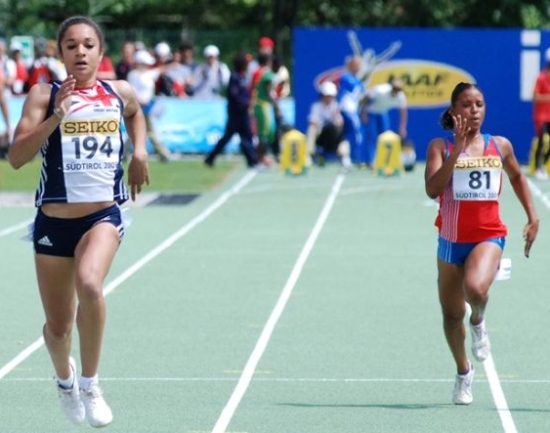
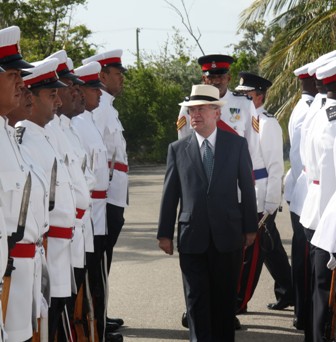
New cops take to streets after 14 week course
 (CNS): Although the Royal Cayman Islands Police Service (RCIPS) is still short on cops 18 new officers started on the beat this week after graduating from their basic training course swelling the total number of officers in the RCIPS to 354. Police said that the fourteen week course tests the recruits’ mental, physical and emotional resilience and the new Police Commissioner David Baines said the recruits were a welcome addition.
(CNS): Although the Royal Cayman Islands Police Service (RCIPS) is still short on cops 18 new officers started on the beat this week after graduating from their basic training course swelling the total number of officers in the RCIPS to 354. Police said that the fourteen week course tests the recruits’ mental, physical and emotional resilience and the new Police Commissioner David Baines said the recruits were a welcome addition.
“Having gone through 14 weeks of tough training they have sworn to protect the communities of the Cayman Islands and are a welcome addition to the Service,” he said at the graduating ceremony on Friday (24 July). Recognizing the supportive role played by family members Baines noted the challenges of the service. “Being a police officer is a challenging task that impacts upon officers but equally, yet less obviously, upon their families and the valuable support given by relatives should not be overlooked,” he added.
RCIPS’ Head of Training, Inspector Anthony White commended the graduates for deciding on a career in the RCIPS which he aid they would take up and bear witness for the protection and preservation of life and property. “They chose to lead and place themselves as a vanguard of what is decent in all of us. How noble that is in such taxing times in our country,” he said. "This class was continually challenged by tragic and unforgiving events surrounding their immediate families, yet they withstood when others may have succumbed. They are proud and will make a strong addition to our complement of officers. They entered as individuals and emerged as a collective, supportive body ready for assisting the community."
Much has been made in the community lately of the problems of recruiting Caymanian officers and the alleged distrust in the local community of officers from other jurisdictions but the break down of the nationality of these 18 recruits was not supplied.
According to the RCIPS website in April this year from the then serving 343 officers the vast majority are Caymanian with 173 local people in the service. There are also a wide selection of countries represented in the forces including 75 from Jamaica, 26 from the UK, 23 from Barbados 7 from Canada and 7 from St Vincent. There are four officers from each of the countries of India, Trinidad, Bahamas and the Philippines and three from Guyana, Honduras and St Lucia. There are also individual recruits from the US, Venezuela, Belize, Haiti and St Thomas.
Anyone with information about crime taking place in the Cayman Islands should contact their local police station or Crime Stoppers on 800-8477 (TIPS). All persons calling Crime Stoppers remain anonymous and are eligible for a reward of up to $1000 should their information lead to an arrest or recovery of property/drugs.
Boat sinks but lives saved
(CNS): Cayman’s marine unit rescued four local residents this afternoon after a boat sunk off the coast of South Sound. Police said that the 911 Emergency Communications Centre received a call at around 1:15pm reporting that a vessel was in distress off South Sound outside the reef. The boat was in heavy surf at that time but was still afloat. Three Marine Unit officers, two police officers and one customs officer were deployed and they launched the Marine Vessel ‘Tornado’ from the South Sound dock at around 1:30pm.
Upon reaching the location, the distressed vessel, an 18-foot Wellcraft fishing boat had sunk leaving a man, his son, nephew and niece struggling in the water. The four were rescued by the Maine Unit crew and brought to shore in a poor condition suffering from exhaustion and water ingestion. They were met by an ambulance crew and were taken to hospital for treatment. Officers have been told that all four should make a full recovery and they are expected to be discharged from the hospital tonight or tomorrow morning.
Head of the Unit, Chief Inspector Courtney Myles commended his officers for their actions, and effectively saving the lives of the four people who had been aboard the vessel. “The officers performed exceptionally well today,” he said. “I have little doubt that they saved these people’s lives.”
Residents are reminded that, when venturing onto the water, they should always check weather reports beforehand and ensure that their radio equipment is fully operational.Boats should also always carry the necessary safety equipment for each person on board, such as life vests.
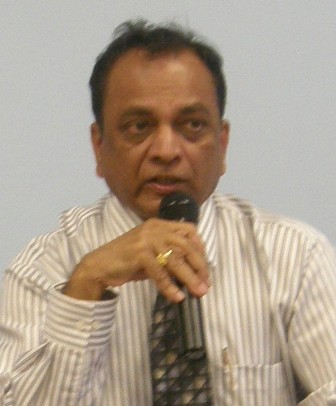
Thousands will have had flu
 (CNS): In the wake of Cayman’s first confirmed death as a result of swine flu, health officials were seeking to reassure the community today that the handling of the pandemic is in line with all WHO guidelines and that people in Cayman are at no greater risk from the virus than anyone anywhere else in the world. Medical Officer of Health Dr Kiran Kumar confirmed that, while there are 60 officially tested and documented cases of swine flu here, there are likely to have been at least 2000 cases as there is no longer a policy of testing everyone.
(CNS): In the wake of Cayman’s first confirmed death as a result of swine flu, health officials were seeking to reassure the community today that the handling of the pandemic is in line with all WHO guidelines and that people in Cayman are at no greater risk from the virus than anyone anywhere else in the world. Medical Officer of Health Dr Kiran Kumar confirmed that, while there are 60 officially tested and documented cases of swine flu here, there are likely to have been at least 2000 cases as there is no longer a policy of testing everyone.
Dr Kumar explained that hundreds of people will have visited private GPs and others would simply have recovered at home without medical intervention. The primary concern now, health officials said, is that those who are in high risk categories ensure they get medical care and that the country continues to monitor the flu for possible mutations. Only those who are sick enough to be in hospital are tested as a matter of course, and the hospital is taking 6 random samples per week, as well, to send to CAREC for surveillance purposes.
Mark Scotland, the Minister for Health, said that while the ministry has been criticised for not doing enough, he reassured the public that staff were in daily contact with the hospital and reacting to advice as quickly as possible as the situation changed.
“We hoped that we would not see any deaths from this virus but sadly, like many countries, we know we now face the same challenges as are occurring all over the world,” he said, adding that any resources required to manage the pandemic would be given to the HSA, but people everywhere were grappling with this flu outbreak.
The minister said the main message remained the same, that people who had flu like symptoms should stay home unless they were from a high risk group, in which case they should seek medical attention. Those include women who are pregnant, the elderly and the very young, those who are obese, people with compromised immune systems, and anyone who has an existing medical condition. Dr Kumar noted that every person who has been hospitalized for H1N1 in Cayman was in a high risk group with a pre-existing medical condition.
Dr Greg Hoeksema said that the problem for health officials now, both locally and globally, was managing the use of Tamiflu and the problems of virus mutation and resistance. The health officials could not say exactly how many people here had been treated with Tamiflu or if the virus was showing any signs of real resistance or mutation, though some tests have been sent to CAREC for that specific purpose. Dr Hoeksema did say there have been a few spontaneous mutations, which he said were different from a whole scale mutation of the virus as it spreads around the world.
With only two drugs that are proving to work on the novel H1N1 strain of flu, the concern of over-use of the Tamiflu is a very real one if the virus does mutate and become more virulent, Hoeksema stated. He said striking the balance between treating those in high risk groups (who had not yet contracted the virus but who had contact with someone who has) with Tamiflu as a preventative measure had to be weighed against the risk of resistance.
Dr Hoeksema said that here in Cayman when the virus first showed itself, the HSA officials had begun by treating the flu aggressively in all those that presented in an attempt to prevent the spread completely. He said that now, however, only patients at high risk of becoming severely ill were being treated. “We have to be judicious with who we choose to treat because of the risk of resistance, especially as we have seen some spontaneous mutating in certain parts of world,” Dr Hoeksema added, noting the difficulty was in the definition of a "high-risk" patient as some young healthy people have become very sick as well.
The message that people who contract the flu, even if they are not feeling too bad, is they should still stay home, not least because they could pass the virus to someone who would be at a higher risk of getting seriously sick if they were to catch the flu.
While no decisions have been made yet about whether schools should re-open as scheduled in September, a consideration in some countries, the health minister said the stay home message was preferable to closing things down. He asked employers to be understanding and allow parents to stay home with sick children, as well sending home anyone who came to work unwell. This, he said, applied to day care centres, summer camps, church services and other public gatherings.

Police net a dozen drunk drivers in George Town
(CNS): Following the arrest of five motorists this weekend for driving while under the influence of alcohol (DUI), the police reported today that the total number of DUI arrests for last week was now twelve people. The latest five arrests were men aged between 23 and 55 who were arrested by uniformed officers in George Town as part of efforts by the police to keep Cayman’s roads safe. Four of the arrests were made Friday night into Saturday morning, while the fifth was made on Sunday evening.
“All road users should be able to move around the Island without fear of encountering a driver who has been drinking,” said Superintendent Adrian Seales, Head of Uniformed Operations. “If you drink and drive you put yourself and others at risk.”
The Royal Cayman Islands Police Service (RCIPS) said that it works hard to ensure motorists obey the rules of the road, which include wearing seatbelts, abiding by the speed limit and not drinking and driving. In 2008 eleven people lost their lives on the road. This year there have been 2 fatal car crashes so far.
“All drivers have a responsibility when they get behind the wheel to ensure their full attention is on the road,” said Seales. “If you drink and drive, your driving is impaired. At worst you are risking your life and the lives of others – at best you are risking your driver’s licence.”
Anyone with information about crime taking place in the Cayman Islands should contact their local police station or Crime Stoppers on 800-8477 (TIPS). All persons calling Crime Stoppers remain anonymous, and are eligible for a reward of up to $1000, should their information lead to an arrest or recovery of property/drugs.

Could machines outsmart us?
 (New York Times): A robot that can open doors and find electrical outlets to recharge itself. Computer viruses that no one can stop. Predator drones, which, though still controlled remotely by humans, come close to a machine that can kill autonomously. Impressed and alarmed by advances in artificial intelligence, a group of computer scientists is debating whether there should be limits on research that might lead to loss of human control over computer-based systems that carry a growing share of society’s workload, from waging war to chatting with customers on the phone. Their concern is that further advances could create profound social disruptions and even have dangerous consequences.
(New York Times): A robot that can open doors and find electrical outlets to recharge itself. Computer viruses that no one can stop. Predator drones, which, though still controlled remotely by humans, come close to a machine that can kill autonomously. Impressed and alarmed by advances in artificial intelligence, a group of computer scientists is debating whether there should be limits on research that might lead to loss of human control over computer-based systems that carry a growing share of society’s workload, from waging war to chatting with customers on the phone. Their concern is that further advances could create profound social disruptions and even have dangerous consequences.
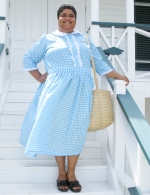
Connecting kids to culture
 (CNS): Nasaria Chollette, Education Officer with the National Museum, is spending the summer sharing Cayman’s cultural heritage with the younger members of the community. Commencing a busy round of cultural activities, Chollete is taking on on the character of “Miss Nas Museum Guru” this week to appear at the Cayman National Cultural Foundation’s (CNCF) summer camp. The camp is part of a Museum drive towards enriching cultural experiences and strengthening their preservation. ‘Miss Nas’ is also scheduled to appear on CITN’s Kidz Stuff programme; she is working on a “Sands of Cayman” exhibition; and she has proposed a “Cultural Cayman” package as part of the induction programme for teachers new to the Islands.
(CNS): Nasaria Chollette, Education Officer with the National Museum, is spending the summer sharing Cayman’s cultural heritage with the younger members of the community. Commencing a busy round of cultural activities, Chollete is taking on on the character of “Miss Nas Museum Guru” this week to appear at the Cayman National Cultural Foundation’s (CNCF) summer camp. The camp is part of a Museum drive towards enriching cultural experiences and strengthening their preservation. ‘Miss Nas’ is also scheduled to appear on CITN’s Kidz Stuff programme; she is working on a “Sands of Cayman” exhibition; and she has proposed a “Cultural Cayman” package as part of the induction programme for teachers new to the Islands.
“The reason I created the ‘Miss Nas’ character is that I wanted to appeal to younger children,” says Chollette, pointing to a felt need to overcome a level of disconnect with Caymanian culture among the younger set. “And I wanted learning to be fun,” she added in a release from the Museum.
At the CNCF summer camp Miss Nas Museum Guru is teaching creative writing with a cultural flair. The camp, which has as its theme ‘Pass it Down’, features local artisans and artists, seeking to pass on traditional arts and crafts, such as crocheting and quadrille, among other indigenous creative activities.
For her role at this week’s CNCF summer camp, Miss Nas is “digging” for stories passed down through families for elaboration by the children. “I am having the students collect stories from their families so they can create their own story books with illustrations,” she says.
For her CITN Kidz Stuff appearance scheduled to be aired later this summer, Miss Nas was filmed at a Colliers, Gun Bay, location, where the cockspur vine is plentiful. The subject of her segment was the seed of the cockspur, known to generations of Cayman’s children as ‘Nickas’. The Cayman cockspur seed is commonly grey, though some rare ones boast an orange yellow hue. The colour and look of the seeds vary from country to country, coming in such exotic patterns as polka dots and stripes in other places.
Traditionally, Nickas have fascinated children because the seeds become hot when stroked in rapid succession against a solid surface. They are also used locally as the pawns in a board game variously called “Wauri” and “Mancala.” “It is really a ‘mind game’, or a ‘strategy game,’ if you will,” explains Chollette, and the game seems to have been passed down in some families over several generations.
Children across the three islands are also busy preparing for the Sands of Cayman project. Miss Nas provided information, which teachers have incorporated into their curricula. Plans are that when schools re-open in September the children will display sand of varioustextures and colours, relating them to specific locations across the Islands. The sand samples will be exhibited in clear, Plexiglas tubes.
As part of another project in preparation for September’s school opening, Chollette has proposed a “Cultural Caravan” as an aspect of the Education Department’s annual teacher induction programme. The new teacher cultural tour package involves a one-day excursion around the Islands, with stops at important cultural and historic sites.
“The aim is also to assist teachers in gaining first-hand insights into Caymanian culture and lifestyles so that they may better understand students and what motivates and affects their classroom responses and behaviours,” says Chollette. She hopes that the programme can be extended to periods throughout the school year to help bridge some of the understandable gaps when new persons come into sensitive roles in the community.
All of these cultural projects are aspects of her efforts on behalf of the Museum to build bridges and effect new understandings and insights into Caymanian culture among a cross-section of the community. This goal will take particular form in the latest project to be launched – that of bringing new life to local folklore by means of the family-story venture at the CNCF summer camp project, she says.
“It’s a simple concept: young people who know their history and are proud of it are strengthened by it and grow into adults who can change the world for the better,” says Chollette. “Rootless people just drift around like coconuts in the sea, fully at the disposal of the waves.”
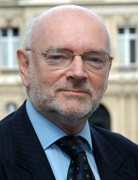
Owens promises white list for Cayman Islands
 (BusinessIFC): Jeffrey Owens, director of the OECD’s Centre for Tax Policy and Administration, has dismissed the possibility that Cayman might not be elevated to the top tier on signature of 12 tax information exchange agreements (TIEAs). "If the government of the Cayman Islands can demonstrate that it has signed 12 high quality tax transparency agreements then it will be admitted to the committed and compliant. The government of the Cayman Islands has said that it wants to sign a network of 30 such agreements. That would be very encouraging,” he said in an interview with BusinessIFC.
(BusinessIFC): Jeffrey Owens, director of the OECD’s Centre for Tax Policy and Administration, has dismissed the possibility that Cayman might not be elevated to the top tier on signature of 12 tax information exchange agreements (TIEAs). "If the government of the Cayman Islands can demonstrate that it has signed 12 high quality tax transparency agreements then it will be admitted to the committed and compliant. The government of the Cayman Islands has said that it wants to sign a network of 30 such agreements. That would be very encouraging,” he said in an interview with BusinessIFC.
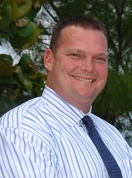
Chamber asks for red carpet
 (CNS): Calling for past differences between the Chamber of Commerce and the new Leader of Government Business, McKeeva Bush, to be set aside, Stuart Bostock, the Chamber President asked for an ‘open for business’ national policy and for red tape to be replaced with the red carpet. Speaking at the Chamber Legislative Lunch last week, Bostock asked the government to demonstrate to the world that Cayman is open for business and called for a review of the public sector.
(CNS): Calling for past differences between the Chamber of Commerce and the new Leader of Government Business, McKeeva Bush, to be set aside, Stuart Bostock, the Chamber President asked for an ‘open for business’ national policy and for red tape to be replaced with the red carpet. Speaking at the Chamber Legislative Lunch last week, Bostock asked the government to demonstrate to the world that Cayman is open for business and called for a review of the public sector.
Bostock took the opportunity to remind the government that investors demand clear, fair and transparent rules and the efficient processing of requests and applications. “We ask government to review the civil service as a matter of priority to determine whether its systems and procedures are suitable for attracting business,” he said.
He added that Cayman’s dynamic free market was under threat from over regulation and bureaucracy. “We must be willing to roll out the red carpet,” Bostock noted and also lamented the detrimental impact crime could have on the economy. He said there was a pressing need to address the escalating level of violence and business crime threatening to destabilize our community. He said the Chamber had worked had over the years with the police to introduce crime stoppers, on fraud prevention and with gun amnesty programmes. He said a new committee had been formed and was in discussion with the new police commissioner about the introduction of a closed circuit television network in public locations and traffic safety cameras.
Speaking directly to members of the business community Bostock called on them to support each other. “During these challenging times it is vitally important for us all to choose Cayman first and keep money circulating in our local economy and government requirements for products and services should be treated no differently.” When people purchased products or services off island, he said they threatened the viability of local businesses and put jobs at risk.
Bostock told chamber members it was time for forward thinking, for people to be progressive and be willing to adapt to change. “Cayman’s size has some real benefits and we can introduce systems and policies much faster than larger economies. The challenge we face as a nation is whether we have the desire and will to change,” he added.
The president who had a further 18 months in post offered the support of the chamber to the LoGB and said he looked forward to attracting new business to the shores of Cayman. Well over 250 members of the business community and government leaders gathered for the Legislative Luncheon where Bush reassured the business community that he would grow Cayman’s economy once again. (See Deficit reaches $75.9M)